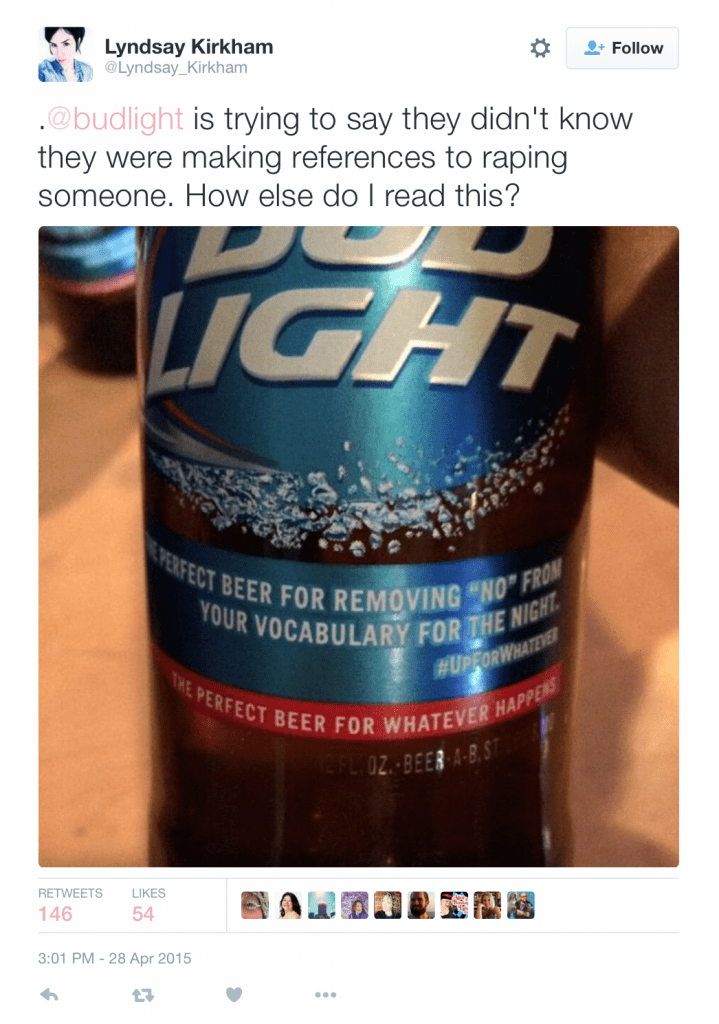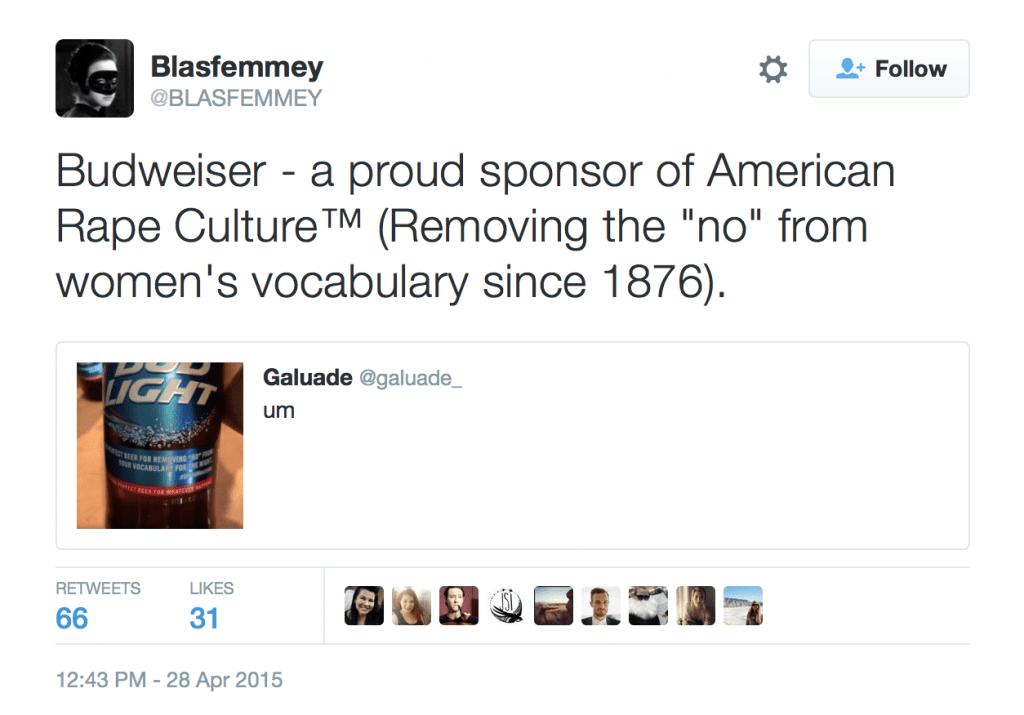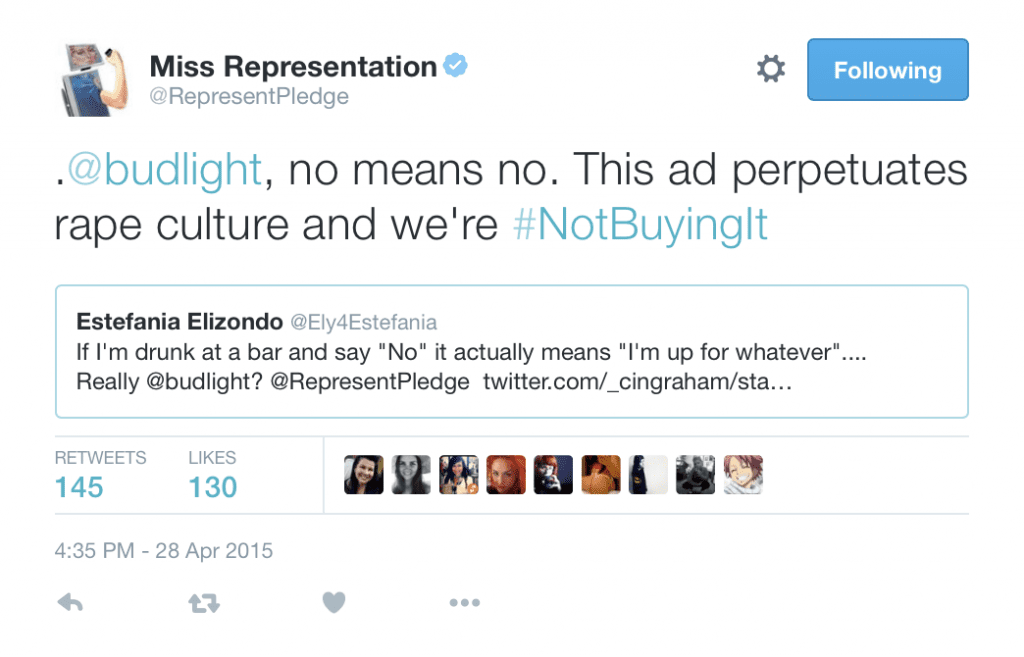The alcohol industry has amassed an outrageous track record of advertisements dehumanising, objectifying and sexualising women. It’s a track record that forever tells of the mindset of the leaders in the alcohol industry: sexism, profit over human rights. There are numerous galleries on the internet, a simple google search away, showing how alcohol producers of all kinds have allied with advertising companies to utilise women for selling their products.
That gallery of shame has now received another display item; an exhibit that might well be classified as the epitome of the decades of alcohol industry sexism.
Anheuser-Busch InBev (AB InBev), the producer of the beer Bud Light, runs a U.S. advertising campaign called “Up for whatever”. The messaging of the overall campaign seems itself – to put it mildly – questionable. It seems to contradict the “responsible consumption” message the alcohol industry prides itself on and it seems to associate alcohol use with social success, adventure and sex appeal.
But the real outcry of criticism came when photos of the beer label and its tagline went viral in the end of April.
Apparently AB InBev deemed it fitting to put this slogan on the Bud Light beer labels: “The perfect beer for removing ‘no’ from your vocabulary for the night.”
This kind of slogan shows how the alcohol industry approaches their favorit subject of “responsible consumption” – namely as a tool to promote their products, not public health. Moreover, the Bud Light beer label and its slogan speak of deeply ingrained sexism and glorification of male dominance over women in the alcohol industry. In one beer label we see decades of perpetuating stereotypes, of dehumanising and sexualising women epitomised.
Twitter calls out AB InBev sexism
The world’s biggest beer producer and owner of the Budweiser beer appears – again – to be ignorant to the problem of sexual assault on U.S. college campuses and alcohol fuelled gender-based violence in U.S. society at large. AB InBev “was implicitly encouraging people to get intoxicated to the point where they are unable to give consent to sex,” writes Al Jazeera USA. The connections to date rape and sexual assault are apparent and people were quick to take to social media and express their outrage and anger.
Research supported by a National Institute on Alcohol Abuse and Alcoholism (NIAAA) grant shows:
Conservative estimates of sexual assault prevalence suggest that 25 percent of American women have experienced sexual assault, including rape. Approximately one-half of those cases involve alcohol consumption by the perpetrator, victim, or both. The researchers write that “Beliefs about alcohol’s effects on sexual and aggressive behavior, stereotypes about drinking women, and alcohol’s effects on cognitive and motor skills contribute to alcohol-involved sexual assault.”
The fact is that the alcohol industry in general and AB InBev in particular have an outrageous track record of associating alcohol use with sexual behavior; of perpetuating stereotypes about women who use alcohol; as well as glamorising the effects of alcohol. CAMY, the Center on Alcohol Marketing and Youth at Johns Hopkins Bloomberg School of Public Health, provides a marketing gallery of unethical print and TV ads. AB InBev, Budweiser and Bud Light are all prominent features in this gallery of alcohol industry sexism.
Watered-down apology
Do you wonder about AB InBev’s response now? Alexander Lambrecht, Vice President of Bud Light Anheuser-Busch, has since apologized for the advertisement’s message:
The Bud Light “Up for Whatever” campaign, now in its second year, has inspired millions of consumers to engage with our brand in a positive and light-hearted way. In this spirit, we created more than 140 different scroll messages intended to encourage brand engagement. It’s clear that this particular message missed the mark, and we regret it.
We would never condone disrespectful or irresponsible behavior. As a result, we have immediately ceased production of this message on all bottles.”
Alexander Lambrecht, Vice President, Bud Light Anheuser-Busch
I think one of the best replies to the campaign itself and the Bud Light “apology” came from the Washington Post’s Alexandra Petri on the ComCast blog, when she wrote about the “watered-down apology” and made the following points:
I know what you mean. I hope. But look at what you said.
Do you not hear how this sounds? Do you not hear how horrible this sounds, when associated with an alcoholic beverage? Have you never heard of consent?
For two years now, you’ve been trying to convince us that if we drink Bud Light, something marginally good might possibly happen to us in an elevator. We could meet a llama! Hey! But is this campaign going at all as you hoped?”
Alexandra Petri, The Washington Post
Not the first time
The fact is: Alcohol is the number one date-rape drug.
Another fact is: Bud Light had to apologise for unethical advertising before. Three years ago they used another ad campaign that was sexualising and objectifying women – in their Bud Light Lime commercial that ran in the context of the Ultimate Fighting Championship (UFC) competition. AB InBev is a major sponsor of the UFC and the ad featured UFC ring girl Arianny Celeste rolling around in a pool of limes and uttering double entendres.
AB InBev has a history of unethical marketing practices, for instance when it comes to how the company has notoriously chosen to depict women. You can find more examples in the CAMY gallery as well as in this article: “13 SEXIST BEER ADS SHOW HOW LITTLE HAS CHANGED SINCE THE 1950s.“
A third fact is: Research shows that “sexist advertising images contribute to an environment conducive to violence against women.” In alcohol ads women are portrayed as the beverage itself – they are the goal and the alcohol. More and more evidence is emerging that shows: Advertising content plays a detectable role in sexual violence.
I read a striking quote of my friend Jean Kilbourne, a longtime scholar on the depiction of women in alcohol and tobacco ads and creator of the documentary film series “Killing Us Softly: Advertising’s Image of Women.” Jean said that the alcohol industry, like the Bud Light executive above, often try and excuse apparent sexism and objectifications in their ads by saying they were meant to be jokes. “But I think we’re certainly at the point where we recognize that rape jokes aren’t funny,” Jean concluded.
We have overwhelming evidence that alcohol is a major risk factor for gender-based violence. At the same time are we living in a culture where the alcohol industry can go on and on with depicting women as dehumanised and sexualised objects. This is an issue for the women’s rights movement and for everyone working for gender equality, and women empowerment. Alcohol and alcohol marketing are obstacles to building better societies where women enjoy the same rights and opportunities as men. Alcohol and alcohol marketing are obstacles to building better societies in which we are not primed anymore by ruthless corporations, like AB InBev or other alcohol industry corporations, to view women as sex symbols and treat them as objects. Enough is enough. And no means no.
For further reading
The Al Jazeera article: Bud Light apology highlights sexism in beer ads, experts say
The Newsweek article: Advertising Professors Assess the Bud Light Fiasco
The Slate article: Bud Light Dreams Up the Worst Possible Slogan for a Beer Company
Evidence
Study: ‘Drink Responsibly’ Messages in Alcohol Ads Promote Products, Not Public Health
Research article: Alcohol and Sexual Assault, by Abbey, A., et. al.
The Guardian article on evidence: Alcohol is by far the most dangerous ‘date rape drug’


